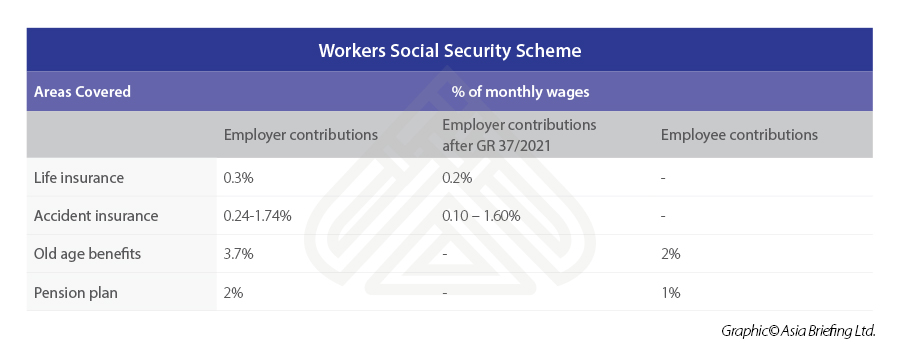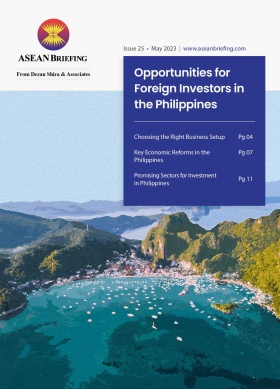Indonesia’s Social Security System: Key Considerations for Payroll
Indonesia has made it mandatory for all Indonesian citizens and expatriates to participate in its social security programs. We discuss key payroll considerations for employers.
Indonesia’s social security programs are run by two organizations – the Social Security Administrator for Health (BPJS Kesehatan) and the Workers Social Security (BPJS Ketenagakerjaan) for pensions. The country launched its universal healthcare and pension programs in 2014, mandating every citizen and expatriate to join.
The government launched its ambitious universal healthcare and pension programs in 2014. Since its inception, the healthcare program has become the biggest in the world with more than 246 million participants. Registered Indonesians and expatriates are eligible for free health services ranging from dental care to medicines to physiotherapy. Further, patients are also eligible for free emergency and chronic care, in addition to organ transplants.
Who is eligible?
The government has made it mandatory for all Indonesian citizens and expatriates to participate in the social security programs. Expat employees must also enroll their families in the programs.
Classification of healthcare class facilities
The BPJS healthcare system is divided into three classes. This does not determine the level of treatment a patient receives, but it does determine the type of hospital room they will be given. Hospital rooms in Indonesia come with varying levels of comfort and size.
Class I patients are provided rooms with two to four other patients while class II patients have to share with three to five others. Class III patients will have to share with five to six patients.
How to calculate the healthcare premiums for employees?
The premium for employees is calculated as five percent of the monthly salary, with a salary cap of 12 million rupiah (US$839).
In the private sector, the employer must pay four percent and the employee the remaining one percent. For civil servants, the government contributes to three percent while the employee contributes two percent. In addition to the employee, the premium also covers their spouse and up to three dependent children up to the age of 21.
Employees earning less than 4 million rupiah (US$279) per month are eligible to receive Class I room facilities at the hospitals. Employees earning lower than this can receive Class II and III room facilities.
How to calculate the healthcare premiums for non-employees?
The new premiums for individuals that are classified as non-employees/self-employed /non-formal workers is as follows:
-
- Class I – 150,000 rupiah (US$10.21) per person, per month;
- Class II – 100,000 rupiah (US$6.80) per person, per month; and
- Class III – 42,000 rupiah (US$2.85) per person, per month (for this specific class, the government will pay 16,600 rupiah (US$1.12) of the total amount, per person, per month)
How do you calculate pension premiums for employees?
The pension program covers the following:
- Accident compensation – provides protection for accidents occurring during or as a result of work;
- Old age benefits – provides protection for participants that are in retirement, laid off;
- Pension benefits – provides guaranteed income in retirement; and
- Life insurance – upon the death of the participant, their heirs can claim the benefits.
Under new regulation 37/2021, which was issued in March 2021, the government has unveiled a new unemployment benefit program, the Job Loss Security program (JLS), the first of its kind in the country.
The JLS scheme does not, however, provide universal coverage as only employees who are already registered with the Workers Social Security program will be eligible. It is the task of employers to enroll any new employees into the program. Employees who have been made redundant and are eligible for unemployment benefits will receive cash stipends for up to six months, further skills training, and career guidance information.
Employers will contribute 0.46 percent of their monthly wages to the JLS program, in which 0.22 percent is contributed by the government and the remaining 0.24 percent from the employer. Importantly, the employer’s contribution is taken from the re-composition of the life insurance and work compensation components of the pension program.
Under GR 37/2021, the employer’s contribution to the life insurance component has been reduced by 0.1 percent from 0.3 percent of the employee’s monthly wage to become 0.2 percent. Further, the work compensation contribution has also been reduced by 0.14 percent from 0.24 to 1.74 percent to produce the new range of 0.10 – 1.60 percent.
The maximum salary used as the basis for the calculation is capped at six months’ salary of 5 million rupiah (US$352).
What are the benefits of the program?
The program offers participants the following benefits:
- Cash stipend — the participant can receive 45 percent of the monthly wage (capped at 5 million rupiah (US$352)) for the first three months, and then 25 percent the following three months.
- The program will also provide career counselling as well as online and offline training.
Sanctions for employers
Employers who fail to register their employees to the program must pay cash compensation to the employee as a lump sum in addition to providing job training.
About Us
ASEAN Briefing is produced by Dezan Shira & Associates. The firm assists foreign investors throughout Asia and maintains offices throughout ASEAN, including in Singapore, Hanoi, Ho Chi Minh City, and Da Nang in Vietnam, in addition to Jakarta, in Indonesia. We also have partner firms in Malaysia, the Philippines, and Thailand as well as our practices in China and India. Please contact us at asean@dezshira.com or visit our website at www.dezshira.com.
- Previous Article Indonesia Proposes Limited FTA with the United States
- Next Article Singapore-UK Bilateral Investment Treaty: Status of Negotiations









